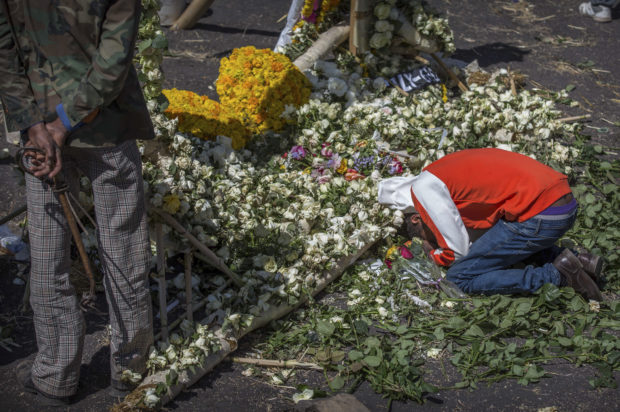Ethiopian Airlines says analysis of flight recorders begins

An Ethiopian relative of a crash victim mourns and grieves next to a floral tribute at the scene where the Ethiopian Airlines Boeing 737 Max 8 crashed shortly after takeoff on Sunday killing all 157 on board, near Bishoftu, south-east of Addis Ababa, in Ethiopia Friday, March 15, 2019. Analysis of the flight recorders has begun in France, the airline said Friday, while in Ethiopia officials started taking DNA samples from victims’ family members to assist in identifying remains. (AP Photo/Mulugeta Ayene)
HEJERE, Ethiopia — Analysis of the flight recorders of the crashed Ethiopian Airlines plane has begun, the airline said Friday, and The New York Times reported that the pilot requested permission “in a panicky voice” to return to the airport shortly after takeoff as the plane dipped up and down sharply and appeared to gain startling speed.
The report cited “a person who reviewed air traffic communications” from Sunday’s flight saying controllers noticed the plane was moving up and down by hundreds of feet.
An airline spokesman has said the pilot was given permission to return.
But the plane crashed minutes later outside Addis Ababa, killing all 157 on board.
French authorities now have the plane’s flight data and voice recorders for analysis.
Article continues after this advertisementThey have said it was unclear whether data could be retrieved.
Article continues after this advertisementThe data recorder appeared to show damage.
Ethiopian Airlines said an Ethiopian delegation led by its chief accident investigator had arrived in Paris.
In Ethiopia, officials started taking DNA samples from victims’ family members to assist in identifying remains. The dead came from 35 countries.
Countries including the United States have grounded the Boeing 737 Max 8 as the U.S.-based company faces the challenge of proving the jets are safe to fly amid suspicions that faulty software might have contributed to two crashes that killed 346 people in less than six months.
The decision to send the flight recorders to France was seen as a rebuke to the United States, which held out longer than most other countries in grounding the jets.
The U.S. National Transportation Safety Board sent three investigators to help French authorities.
Boeing executives announced that they had paused delivery of the Max, although the company planned to continue building the jets while it weighs the effect of the grounding on production.
The U.S. Federal Aviation Administration in grounding the planes said regulators had new data from the satellite-based tracking that showed the movements of Ethiopian Airlines Flight 302 were similar to those of Lion Air Flight 610.
That flight crashed into the Java Sea off Indonesia in October, killing 189 people.
Boeing said it supports the grounding of its planes as a precautionary step, while reiterating its “full confidence” in the safety of the 737 Max.
Engineers are making changes to the system designed to prevent an aerodynamic stall if sensors detect that the jet’s nose is pointed too high and its speed is too slow.
Satellite-based data showed that both the Ethiopian Airlines and Lion Air planes flew with erratic altitude changes that could indicate the pilots struggled to control the aircraft.
Both crews tried to return to the airport.
The Max is the latest upgrade to the Boeing 737s.
Because its engines were larger and heavier, they were placed higher and farther forward on the wings.
That created concern that the plane might be slightly more prone to an aerodynamic stall if not flown properly, so Boeing developed software to prevent that. / gsg